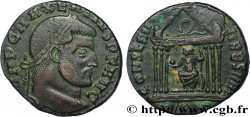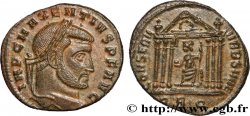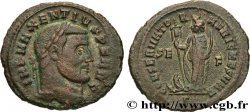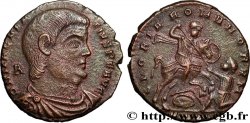v36_0823 - MAXENTIUS Follis ou nummus
MONNAIES 36 (2008)
Starting price : 120.00 €
Estimate : 200.00 €
unsold lot
Starting price : 120.00 €
Estimate : 200.00 €
unsold lot
Type : Follis ou nummus
Date: fin
Date: 309
Mint name / Town : Toscane et Ombrie, Ostie
Metal : copper
Diameter : 25 mm
Orientation dies : 12 h.
Weight : 6,41 g.
Rarity : R1
Officine: 1re
Emission: 1re
Coments on the condition:
Exemplaire sur un flan bien centré des deux côtés. Usure superficielle des deux côtés. Style fin, très particulier ne correspondant pas au monnayage de l’atelier d’Ostie. Patine marron foncé
Catalogue references :
Obverse
Obverse legend : IMP C MAXENTIVS P F AVG.
Obverse description : Tête laurée de Maxence à droite (O*).
Obverse translation : "Imperator Cæsar Maxentius Pius Felix Augustus", (L’empereur césar Maxence pieux heureux auguste).
Reverse
Reverse legend : AET-ERNITAS A-VG N/ -|-// MOSTA.
Reverse description : Castor et Pollux (les Gémeaux ou les Dioscures), surmontés d'une étoile, nus debout face à face, le manteau sur l'épaule gauche, tenant chacun un sceptre long et de la main gauche, la bride de leurs chevaux ; au centre la louve debout à gauche allaitant Rémus et Romulus.
Reverse translation : "Æternitas Augusti Nostri", (L'Éternité de notre auguste).
Commentary
Rubans de type 2 aux extrémités bouletées. Revers inhabituel avec une césure de légende de revers particulière. L’exemplaire de MONNAIES IX, n° 551 s’était vendu 265€ sur une estimation de 100/145€ avec un maximum à 277€. En quinze ans, nous n’avons proposé ce type que quatre fois à la vente.








 Report a mistake
Report a mistake Print the page
Print the page Share my selection
Share my selection Ask a question
Ask a question Consign / sell
Consign / sell
 Full data
Full data











